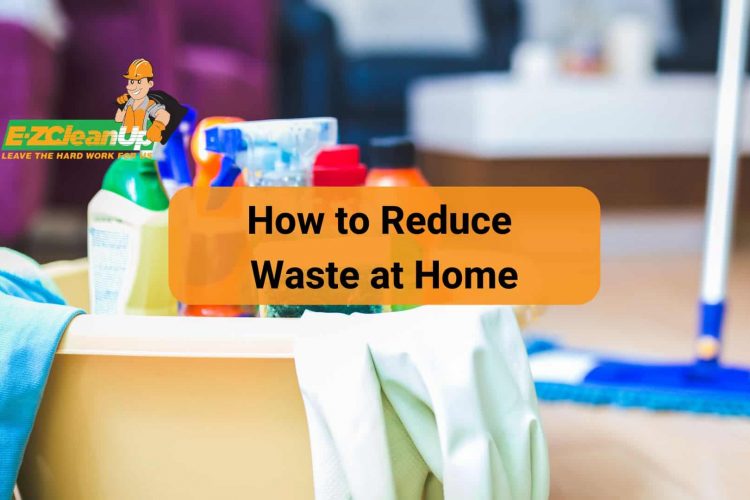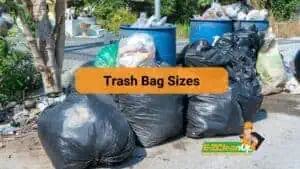Minimize home waste by using less packaging, reusable containers, composting, buying sustainable goods, reducing food waste, recycling smartly, making DIY products, decluttering, using digital solutions, and educating on sustainability. These steps collectively enhance eco-friendliness.
Here are ten practical methods on how to reduce waste at home and minimize your plastic footprint:
#1: Avoid Plastic Packaging
Choose products with minimal or no packaging when shopping. When shopping, prioritize items that use minimal packaging or are packaged in recyclable materials. Consider buying in bulk to reduce the amount of packaging per product.
Purchasing bulk goods not only reduces packaging waste but also often saves money. Stores that allow you to refill your own containers are particularly effective at minimizing plastic use. This method can apply to a wide range of products, from dry groceries like rice and cereal to cleaning supplies and personal care items.
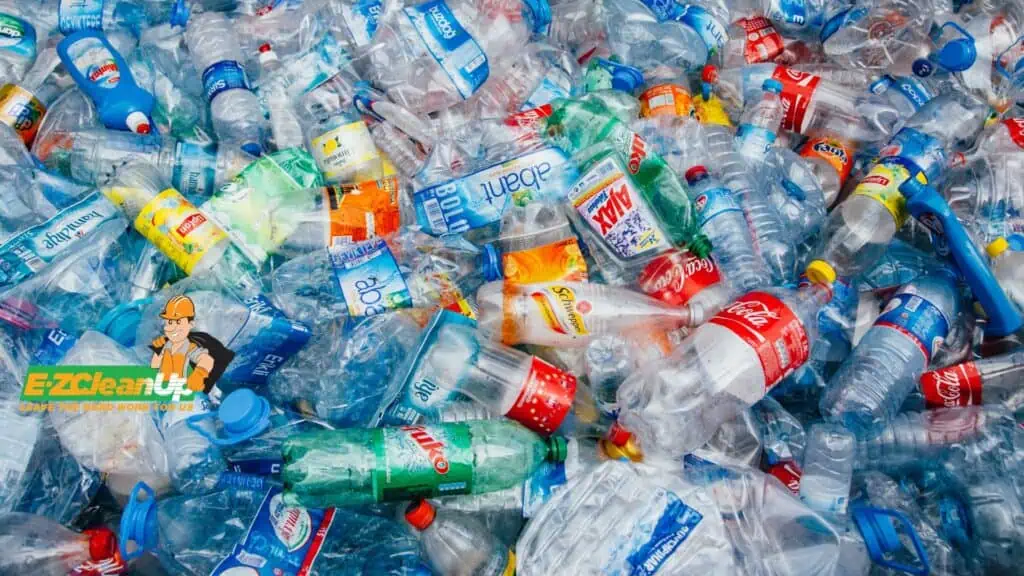
#2: Utilize Reusable Containers
Making a shift towards reusable containers is an effective strategy to minimize waste at home, promoting environmental sustainability and health benefits. Here’s how you can integrate reusable items into your daily routine:
Replace Single-Use Water Bottles and Cups With Reusable Ones
Transitioning to reusable water bottles significantly cuts down on plastic waste and financial expenditure. By switching to a sturdy, refillable option, Americans could easily save $260 annually on disposable water bottles.
Reusable bottles are widely accessible and come in various materials like stainless steel, glass, or safe plastics, which are not only better for the environment but also healthier for you. This is because they do not contain the harmful chemicals often found in single-use plastics.
Use Cloth and Mesh Bags Instead of Plastic Ones
Using cloth and mesh bags for your groceries reduces the amount of single-use plastics that ends up in landfills and oceans. These reusable bags allow you to carry more items per bag, but they are also more sustainable.
The production and disposal of plastic bags contribute significantly to pollution and resource depletion.
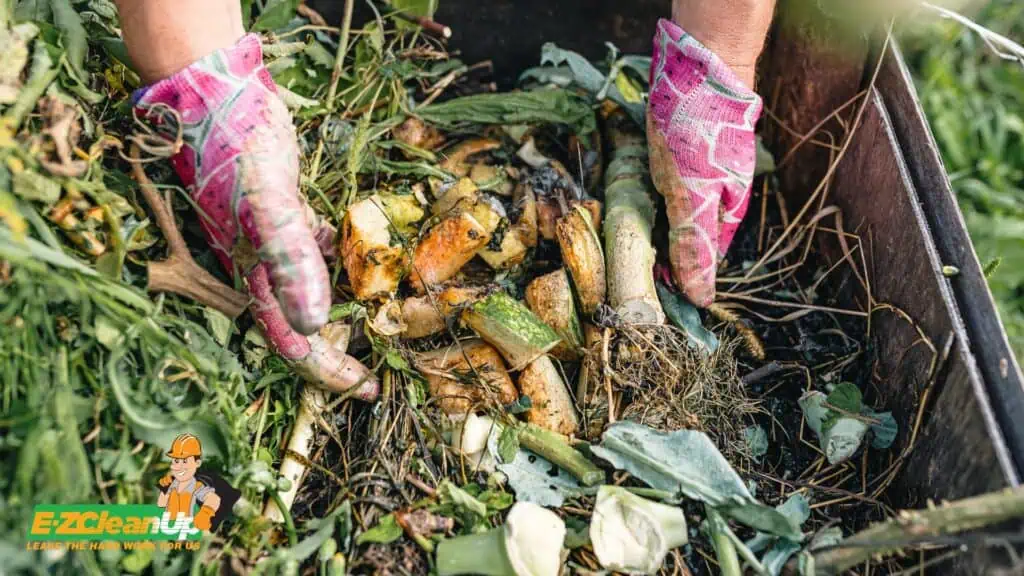
#3: Compost Organic Waste
Composting organic waste at home offers many environmental benefits and can significantly enhance the quality of your garden soil. Here’s how you can get started and effectively utilize compost:
Set up a Home Composting System for Food Scraps and Yard Waste
To establish a successful composting system, start by selecting an appropriate location for your compost bin or pile. The ideal spot is in a dry, shady area close to a water source.
Begin your compost with a layer of bulky, carbon-rich materials like twigs or wood chips to aid drainage and airflow. Then, alternate with nitrogen-rich materials, such as kitchen scraps and yard waste. This will maintain a balance to support the composting process.
Regular maintenance of your compost includes turning the pile to introduce oxygen and checking moisture levels to keep it damp. These will help accelerate decomposition and prevent odor.
Utilize Compost in the Garden to Reduce Fertilizer Use
Incorporating compost into your garden can dramatically improve soil structure. It enriches the soil with nutrients and enhances its moisture retention capabilities. This fosters healthier plant growth while reducing the need for chemical fertilizers.
By improving soil fertility, compost can lead to higher yields in your vegetable plots or more vibrant flower beds. It also aids in water conservation. This is because a well-maintained compost helps the soil hold moisture more effectively during dry periods.
#4: Invest in Sustainable Goods
Choose products made from sustainable materials. These products are typically created with resources that are renewable, like bamboo, hemp, or recycled materials. When shopping, look for certifications like FSC for wood products or GOTS for textiles. They ensure that the products meet rigorous environmental and social standards.
Support Local Businesses That Prioritize Eco-Friendly Practices
Small businesses often produce unique, high-quality products and provide personalized services that enhance community ties. By choosing local, you’re also likely to end up with fresher, more sustainable options. This is because these businesses typically have shorter supply chains and are more accountable to their local customers.
Additionally, many small businesses are leaders in adopting sustainable practices. Many of them use eco-friendly materials and minimize waste, which contributes to a healthier environment.
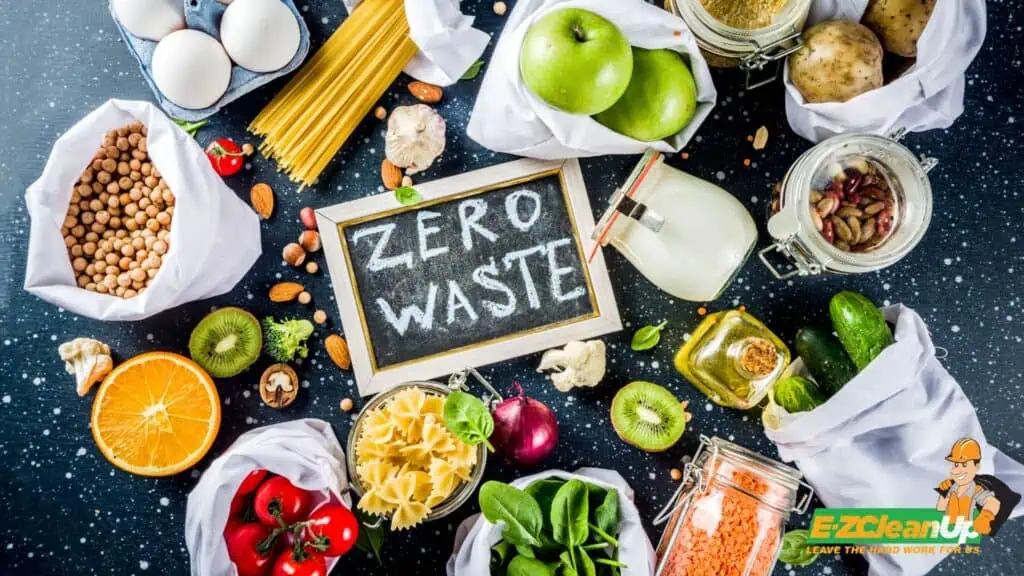
#5: Reduce Food Waste
First, make it part of your routine to plan meals to avoid over-purchasing. By assessing what you already have in your fridge and pantry, you can avoid buying excess food.
Planning your meals for the week helps you purchase only the necessary items. This will ensure everything gets used before it spoils. This practice reduces waste while helping to manage grocery budgets more effectively.
Store Food Properly to Extend Its Freshness and Usability
Proper storage of food significantly extends its freshness and usability. For instance, certain fruits emit ethylene gas, which can accelerate ripening in nearby produce. Storing such fruits separately can help maintain the freshness of other vegetables and fruits.
Utilizing your freezer for leftovers, bread, or even ripe fruits can extend their lives and reduce the need to discard food. Moreover, labeling leftovers with dates and storing them in clear containers can help you keep track of what needs to be consumed.
#6: Practice Smart Recycling
Each community has specific rules about what can and cannot be recycled. It’s crucial to get acquainted with your local recycling guidelines to ensure proper sorting and disposal of recyclables.
This helps prevent contamination and increases the efficiency of recycling programs. Many local government or waste management websites offer detailed guides and resources to help residents understand acceptable materials and the process involved.
Recycle Electronics and Batteries
Electronics and batteries should not be disposed of with regular waste due to their harmful environmental impact and potential for resource recovery. Specialized e-waste recycling programs are available to handle these items safely.
These programs ensure that hazardous materials are properly managed and valuable components like metals are recovered. Check with local electronic stores, waste management services, or community drop-off events for options to recycle these items responsibly.
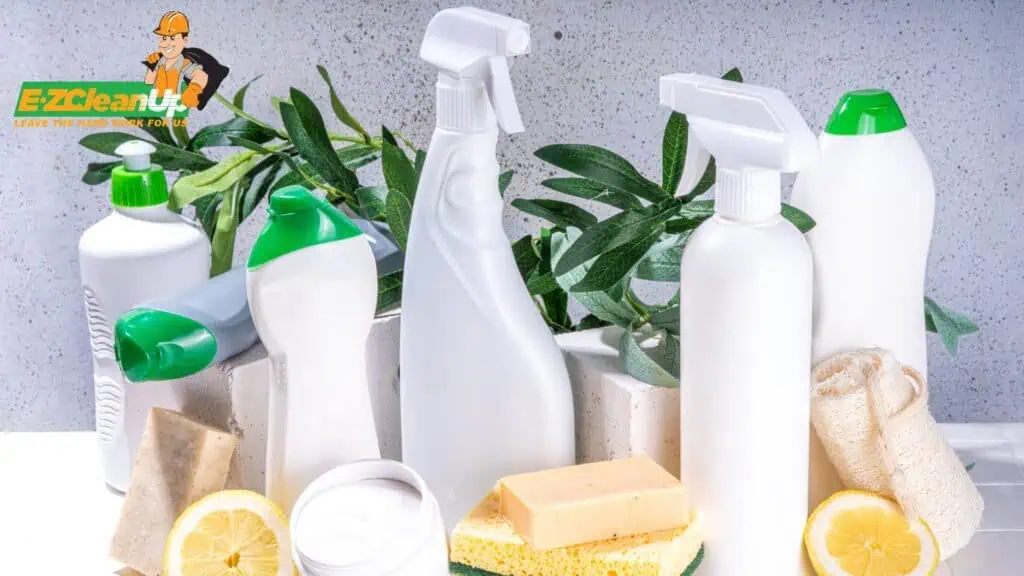
#7: DIY Household Products
Creating your own cleaning products using natural ingredients like vinegar, baking soda, and essential oils can significantly reduce the presence of harmful chemicals in your home. This protects your health while helping reduce environmental pollution.
Additionally, DIY methods typically use less packaging. It further decreases waste and resource consumption. Ingredients such as lemon, thyme, and tea tree oil are not only effective cleaners but also bring antimicrobial properties to your homemade products.
For personal care, using simple, natural ingredients can be gentler on the skin and more environmentally friendly. For instance, creating your own lotions, balms, or soaps allows you to avoid the harmful chemicals often found in commercial products. These include parabens and phthalates, which can disrupt hormones and cause other health issues.
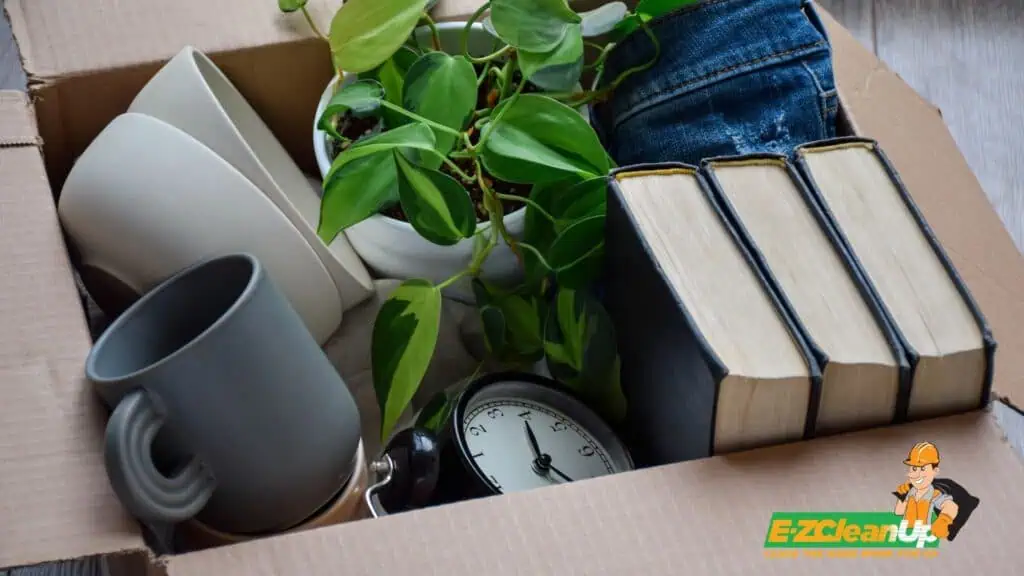
#8: Declutter and Donate
Regular decluttering helps maintain a clean and organized home environment, which can significantly enhance mental clarity and reduce stress. Donating items that you no longer need supports charitable causes and provides essential goods to those in need.
Organizing or participating in community swap events is a fantastic way to give items a second chance at usefulness while engaging with your community. These events encourage the reuse of goods, which reduces waste and fosters a sense of community solidarity and support.
It’s also an opportunity to obtain new items you may need without purchasing new ones. This can help you save on resources while reducing the demand for new products.
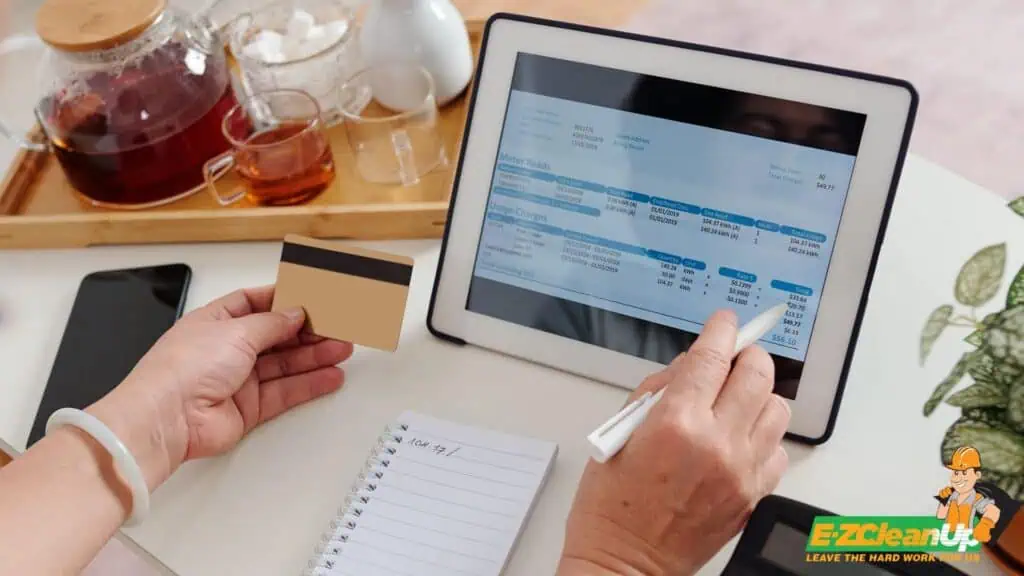
#9: Opt for Digital Solutions
Adopting digital bills and receipts can dramatically reduce paper waste. Traditional paper billing involves substantial use of paper. Digital options provide an eco-friendly alternative by eliminating the need for physical copies.
Moreover, digital subscriptions to magazines and newspapers ensure that you receive the latest updates without the physical clutter of paper copies. This shift supports environmental sustainability by decreasing the demand for paper.
Additionally, digital formats often provide interactive features that enrich the reading experience. They make it more engaging and personalized.

#10: Educate and Involve
Gaining knowledge about waste reduction strategies empowers individuals to implement sustainable practices in their daily lives and to educate others. This fosters a well-informed community while cultivating a culture of sustainability.
Resources such as community workshops, online platforms, and local environmental groups can provide valuable information and training on reducing waste effectively.
Participation in community clean-up events or other waste reduction initiatives is a direct way to contribute to environmental preservation. These activities help beautify the community and reduce pollution. They also help strengthen community bonds by bringing people together for a common cause.
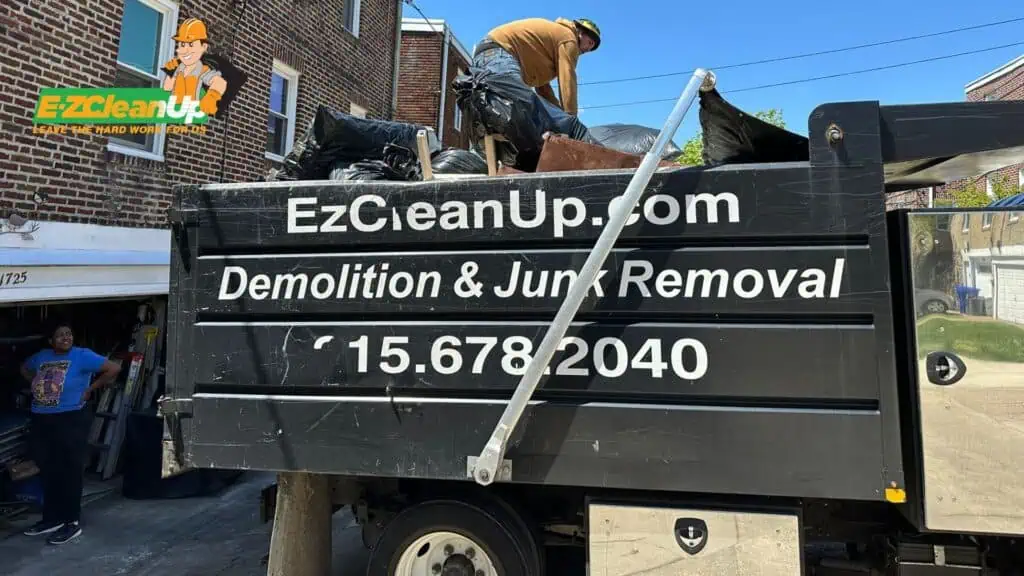
Cut the Clutter, Not Corners
As you embrace ways to reduce household waste, such as using reusable products and avoiding unnecessary packaging, you’re taking significant steps towards sustainability. But what about the waste that’s already there?
EZ CleanUp can assist in handling the larger aspects of waste management. Our junk removal services complement your environmental efforts by ensuring that the disposal of large items and construction debris is handled with care and responsibility.
Ready to clear the clutter responsibly? Contact us, and we’ll handle it for you.

